April 17, 2016
On Saturday, April 15, 2016, Pope Francis, Ecumenical Patriarch Bartholomew and Archbishop of Athens Hieronimos visited the Greek Island of Levbos where thousands of refugees from middle East live in migrant facilities.
There were emotional scenes as the pope visited the migrant facility of Moria, greeting unaccompanied minors, women and small children who gave him over a dozen drawings.
The three religious leaders signed a joint declaration that calls on the international community to “respond with courage in facing this massive humanitarian crisis and its underlying causes through diplomatic, political and charitable initiatives.”
* * *
Joint Declaration of Pope Francis, Ecumenical Patriarch Bartholomew and Archbishop of Athens Hieronimos
We, Pope Francis, Ecumenical Patriarch Bartholomew and Archbishop Ieronymos of Athens and All Greece, have met on the Greek island of Lesvos to demonstrate our profound concern for the tragic situation of the numerous refugees, migrants and asylum seekers who have come to Europe fleeing from situations of conflict and, in many cases, daily threats to their survival. World opinion cannot ignore the colossal humanitarian crisis created by the spread of violence and armed conflict, the persecution and displacement of religious and ethnic minorities, and the uprooting of families from their homes, in violation of their human dignity and their fundamental human rights and freedoms.
The tragedy of forced migration and displacement affects millions, and is fundamentally a crisis of humanity, calling for a response of solidarity, compassion, generosity and an immediate practical commitment of resources. From Lesvos, we appeal to the international community to respond with courage in facing this massive humanitarian crisis and its underlying causes, through diplomatic, political and charitable initiatives, and through cooperative efforts, both in the Middle East and in Europe.
As leaders of our respective Churches, we are one in our desire for peace and in our readiness to promote the resolution of conflicts through dialogue and reconciliation. While acknowledging the efforts already being made to provide help and care to refugees, migrants and asylum seekers, we call upon all political leaders to employ every means to ensure that individuals and communities, including Christians, remain in their homelands and enjoy the fundamental right to live in peace and security. A broader international consensus and an assistance programme are urgently needed to uphold the rule of law, to defend fundamental human rights in this unsustainable situation, to protect minorities, to combat human trafficking and smuggling, to eliminate unsafe routes, such as those through the Aegean and the entire Mediterranean, and to develop safe resettlement procedures. In this way we will be able to assist those countries directly engaged in meeting the needs of so many of our suffering brothers and sisters. In particular, we express our solidarity with the people of Greece, who despite their own economic difficulties, have responded with generosity to this crisis.
Together we solemnly plead for an end to war and violence in the Middle East, a just and lasting peace and the honourable return of those forced to abandon their homes. We ask religious communities to increase their efforts to receive, assist and protect refugees of all faiths, and that religious and civil relief services work to coordinate their initiatives. For as long as the need exists, we urge all countries to extend temporary asylum, to offer refugee status to those who are eligible, to expand their relief efforts and to work with all men and women of good will for a prompt end to the conflicts in course.
Europe today faces one of its most serious humanitarian crises since the end of the Second World War. To meet this grave challenge, we appeal to all followers of Christ to be mindful of the Lord’s words, on which we will one day be judged: “For I was hungry and you gave me food; I was thirsty and you gave me drink; I was a stranger and you took me in; I was naked and you clothed me; I was sick and you visited me; I was in prison and you came to me … Assuredly, I say to you, inasmuch as you did it to one of the least of these my brethren, you did it to me” (Mt 25:35-36, 40).
For our part, in obedience to the will of our Lord Jesus Christ, we firmly and wholeheartedly resolve to intensify our efforts to promote the full unity of all Christians. We reaffirm our conviction that “reconciliation (among Christians) involves promoting social justice within and among all peoples… Together we will do our part towards giving migrants, refugees and asylum-seekers a humane reception in Europe” (Charta Oecumenica, 2001). By defending the fundamental human rights of refugees, asylum-seekers and migrants, and the many marginalized people in our societies, we aim to fulfil the Churches’ mission of service to the world.
Our meeting today is meant to help bring courage and hope to those seeking refuge and to all those who welcome and assist them. We urge the international community to make the protection of human lives a priority and, at every level, to support inclusive policies which extend to all religious communities. The terrible situation of all those affected by the present humanitarian crisis, including so many of our Christian brothers and sisters, calls for our constant prayer.
Lesvos, 16 April 2016
Ieronymos II Francis Bartholomew I
* * *
In addition to signing a joint declaration, each hierarch gave an address at the Moria refugee camp in Lesvos:
Greetings of Ecumenical Patriarch Bartholomew
Dearest brothers and sisters,
Precious youth and children,
We have traveled here to look into your eyes, to hear your voices, and to hold your hands. We have traveled here to tell you that we care. We have traveled here because the world has not forgotten you.
With our brothers, Pope Francis and Archbishop Ieronymos, we are here today to express our solidarity and support for the Greek people, who have welcomed and cared for you. And we are here to remind you that - even when people turn away from us - nevertheless "God is our refuge and strength; God is our help in hardship. Therefore, we shall not be afraid" (Ps 45: 2-3).
We know that you have come from areas of war, hunger and suffering. We know that your hearts are full of anxiety about your families. We know that you are looking for a safer and brighter future.
We have wept as we watched the Mediterranean Sea becoming a burial ground for your loved ones. We have wept as we witnessed the sympathy and sensitivity of the people of Lesvos and other islands. But we also wept as we saw the hard-heartedness of our fellow brothers and sisters - your fellow brothers and sisters - close borders and turn away.
Those who are afraid of you have not looked at you in the eyes. Those who are afraid of you do not see your faces. Those who are afraid of you do not see your children.
They forget that dignity and freedom transcend fear and division. They forget that migration is not an issue for the Middle East and Northern Africa, for Europe and Greece. It is an issue for the world.
The world will be judged by the way it has treated you. And we will all be accountable for the way we respond to the crisis and conflict in the regions that you come from.
The Mediterranean Sea should not be a tomb. It is a place of life, a crossroad of cultures and civilizations, a place of exchange and dialogue. In order to rediscover its original vocation, the Mare Nostrum, and more specifically the Aegean Sea, where we gather today, must become a sea of peace. We pray that the conflicts in the Middle East, which lie at the root of the migrant crisis, will quickly cease and that peace will be restored. We pray for all the people of this region. We would particularly like to highlight the dramatic situation of Christians in the Middle East, as well as the other ethnic and religious minorities in the region, who need urgent action if we do not want to see them disappear.
We promise that we shall never forget you. We shall never stop speaking for you. And we assure you that we will do everything to open the eyes and hearts of the world.
Peace is not the end of History. Peace is the beginning of a History tied to the future. Europe should know that better than any other continent.
This beautiful island we stand right now is just a dot in the map.
To dominate the wind and the rough sea Jesus, according to Luke, called a halt to the blow outright when the ship He and His disciples embarked was in danger. Eventually calm succeeded the storm.
God bless you. God keep you. And God strengthen you.
* * *
Greetings from Archbishop Ieronymos of Athens
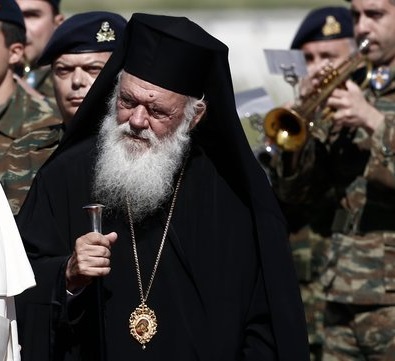
It is with unique joy that we welcome today to Lesvos the Head of the Roman-Catholic Church, Pope Francis.
We consider his presence in the territory of the Church of Greece to be pivotal. Pivotal because together we bring forward before the whole world, Christian and beyond, the current tragedy of the refugee crisis.
I warmly thank His All-Holiness, and my beloved brother in Christ, Ecumenical Patriarch Bartholemew; who blesses us with his presence as the First of Orthodoxy, uniting through his prayer, so that the voice of the Churches can be more vocal and heard at the all the ends of the civilized world.
Today we unite our voices in condemning their uprooting, to decry any form of depreciation of the human person.
From this island, Lesvos, I hope to begin a worldwide movement of awareness in order for this current course to be changed by those who hold the fate of nations in their hands and bring back the peace and safety to every home, to every family, to every citizen.
Unfortunately it is not the first time we denounce the politics that have brought these people to this impasse. We will act however, until the aberration and depreciation of the human person has stopped.
We do not need to say many words. Only those who see the eyes of those small child that we met at the refugee camps will be able to immediately recognize, in its entirety, the "bankruptcy" of humanity and solidarity that Europe has shown these last few years to these, and not only these, people.
I take pride in the Greeks, who even though going through there own struggles, are helping the refugees make their own Calvary (Golgotha) a little less ponderous, their uphill road a little less rough.
The Church of Greece and myself, personally, mourn the so many souls lost in the Aegean. We have already done a great deal, and we will continue to do so, as much as our abilities allow for us to undertake in handling this refugee crisis. I would like to close this declaration by making one request, a single call, a single provocation: for the agencies of the United Nations to finally, using the great experience that they offer, address this tragic situation that we are living. I hope that we never see children washing up on the shores of the Aegean. I hope to soon see them there, untroubled, enjoying life.
* * *
Greeting of His Holiness Pope Francis
Dear Friends,
I have wanted to be with you today. I want to tell you that you are not alone. In these weeks and months, you have endured much suffering in your search for a better life. Many of you felt forced to flee situations of conflict and persecution for the sake, above all, of your children, your little ones. You have made great sacrifices for your families. You know the pain of having left behind everything that is dear to you and - what is perhaps most difficult - not knowing what the future will bring. Many others like you are also in camps or towns, waiting, hoping to build a new life on this continent.
I have come here with my brothers, Patriarch Bartholomew and Archbishop Ieronymos, simply to be with you and to hear your stories. We have come to call the attention of the world to this grave humanitarian crisis and to plead for its resolution. As people of faith, we wish to join our voices to speak out on your behalf. We hope that the world will heed these scenes of tragic and indeed desperate need, and respond in a way worthy of our common humanity.
God created mankind to be one family; when any of our brothers and sisters suffer, we are all affected. We all know from experience how easy it is for some to ignore other people's suffering and even to exploit their vulnerability. But we also know that these crises can bring out the very best in us. You have seen this among yourselves and among the Greek people, who have generously responded to your needs amid their own difficulties. You have also seen it in the many people, especially the young from throughout Europe and the world, who have come to help you. Yes, so much more needs to be done! But let us thank God that in our suffering he never leaves us alone. There is always someone who can reach out and help us.
This is the message I want to leave with you today: do not lose hope! The greatest gift we can offer one another is love: a merciful look, a readiness to listen and understand, a word of encouragement, a prayer. May you share this gift with one another. We Christians love to tell the story of the Good Samaritan, a foreigner who saw a man in need and immediately stopped to help. For us, it is a story about God's mercy which is meant for everyone, for God is the All-Merciful. It is also a summons to show that same mercy to those in need. May all our brothers and sisters on this continent, like the Good Samaritan, come to your aid in the spirit of fraternity, solidarity and respect for human dignity that has distinguished its long history.
Dear friends, may God bless all of you and, in a special way, your children, the elderly and all those who suffer in body and spirit! I embrace all of you with affection. Upon you, and those who accompany you, I invoke his gifts of strength and peace.

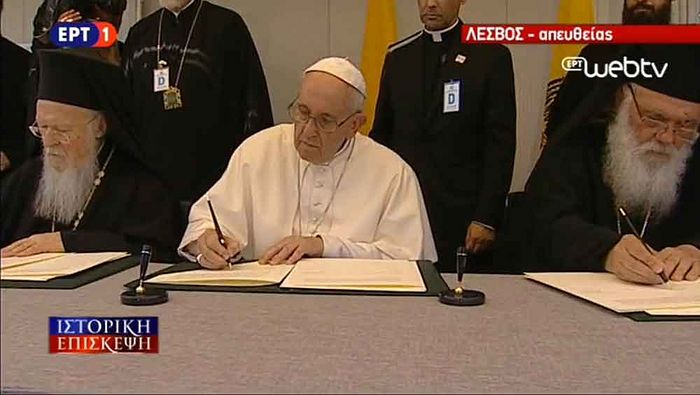
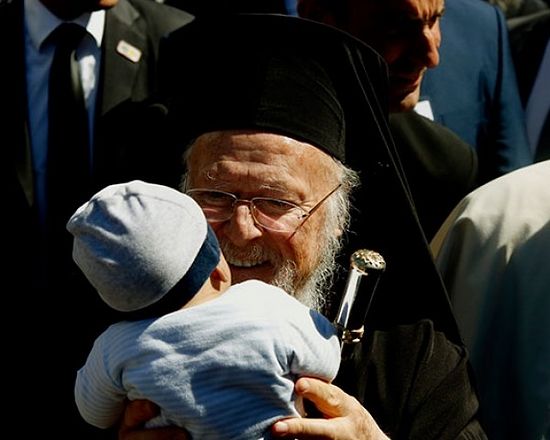
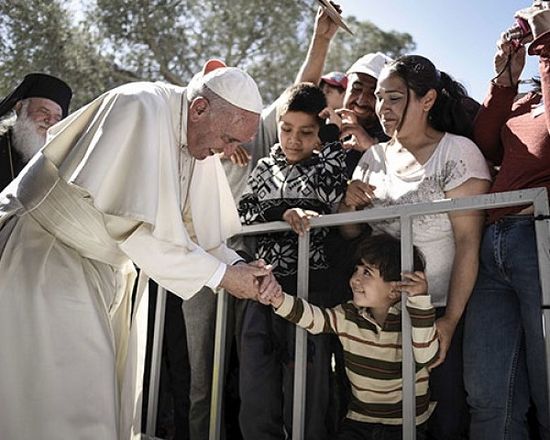
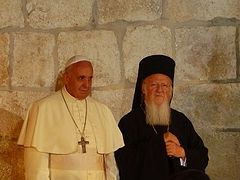
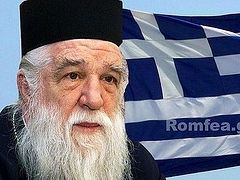
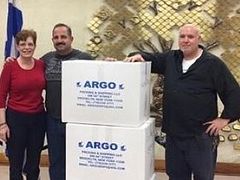
Another confirmation of why we lost Constantinopolis.